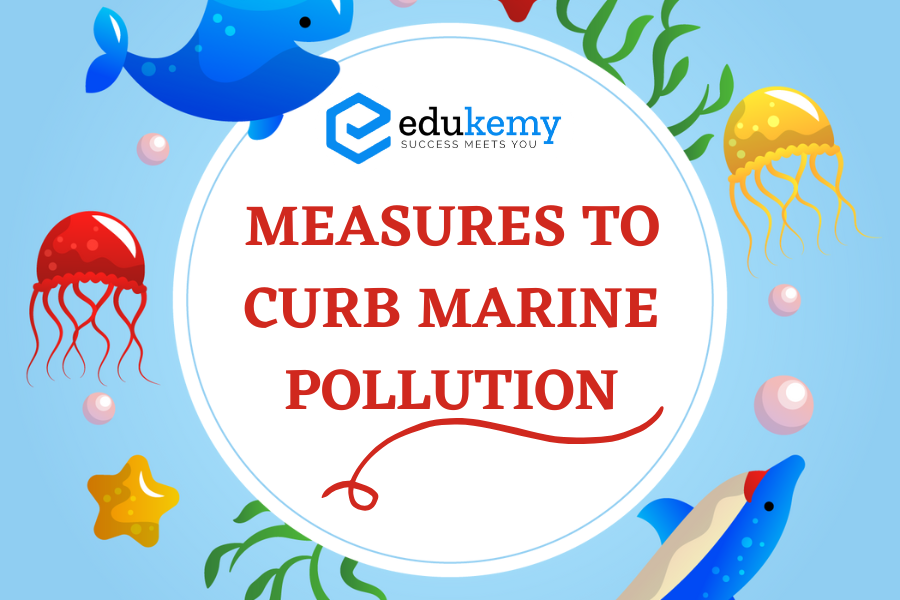- Marine pollution occurs when substances introduced or discharged by human activities, such as industrial, agricultural, and residential waste, particulate matter, noise, excessive carbon dioxide, or invasive species, enter the water and cause adverse effects.
- The primary source of this pollution (80%) is attributed to land-based activities, with a notable contribution from marine transportation.
- Given that the majority of inputs originate from the land, whether through rivers, sewage, or atmospheric deposition, continental shelves are particularly vulnerable to marine pollution.
- Additionally, air pollution plays a role in contaminating the oceans by transporting substances like iron, carbonic acid, nitrogen, silicon, sulfur, pesticides, and dust particles.
Contents
MARINE POLLUTION- MITIGATION
- It is recommended to curtail offshore drilling by transitioning to renewable energy sources like wind and solar power.
- In agriculture, the use of pesticides should be restricted, and there should be an emphasis on promoting organic farming and environmentally friendly pesticides.
- Efforts should be directed towards sewage treatment, and exploring environmentally sustainable wastewater treatment options.
- To prevent spills, there should be a reduction in industrial and manufacturing waste and proper containment measures in landfills.
- Biotechnology, specifically bioremediation using specialized microbes, can be employed to treat oil spills effectively.
- Individuals can contribute to environmental preservation by reducing their personal carbon footprint by adopting a “green” lifestyle.
- A global convention is imperative to prohibit the use of single-use plastics, and collaborative efforts are essential to clean up the oceans.
GLOBAL INITIATIVE – TO COMBAT MARINE POLLUTION
Global Programme of Action (GPA):
- The Global Program of Action for the Protection of the Marine Environment from Land-based Activities (GPA) is a unique intergovernmental instrument established to address land-based pollution comprehensively.
- It is the first global intergovernmental initiative explicitly designed to recognize the interconnectedness of terrestrial, freshwater, coastal, and marine ecosystems.
- In 1995, during an intergovernmental summit in Washington, D.C., the GPA gained acceptance from 108 governments and the European Commission.
- Implementation of the GPA involves collaboration among governments and various stakeholders, including international and public organizations, local communities, non-governmental organizations, and the commercial sector.
MARPOL Convention (1973):
- The MARPOL Convention addresses ship pollution of the marine environment caused by operational or unintentional factors.
- It outlines various types of maritime pollution resulting from oil, toxic liquid chemicals, packaged dangerous substances, sewage, and waste from ships.
- Enacted in 1973, this convention is a significant international agreement regulating marine pollution.
London Convention (1972):
- The London Convention, established in 1972, aims to promote effective regulation of all sources of marine pollution.
- It emphasizes taking reasonable actions to prevent the pollution of the sea from waste and other materials that are disposed of into it.
Greenpeace:
- Greenpeace is a non-profit organization committed to safeguarding the seas and marine life globally.
- Through grassroots initiatives, it has successfully advocated for the prohibition of damaging fishing techniques.
- The organization has influenced changes in fishing strategies by numerous companies, and it has played a role in establishing whale sanctuaries.
- Greenpeace continues its efforts to protect the environment through activism and awareness campaigns.
FAQs – Marine Pollution:
1. What is marine pollution?
A: Marine pollution occurs when substances introduced or discharged by human activities, such as industrial, agricultural, and residential waste, enter the water and cause adverse effects. This includes particulate matter, noise, excessive carbon dioxide, and invasive species.
2. What are the primary sources of marine pollution?
A: The main contributors (80%) to marine pollution are land-based activities, with a significant impact from marine transportation. Inputs from rivers, sewage, and atmospheric deposition make continental shelves particularly vulnerable.
3. How does air pollution contribute to marine pollution?
A: Air pollution transports substances like iron, carbonic acid, nitrogen, silicon, sulfur, pesticides, and dust particles, playing a role in contaminating oceans.
4. Why is it recommended to curtail offshore drilling?
A: Transitioning to renewable energy sources like wind and solar power helps reduce the impact of offshore drilling on marine ecosystems.
5. How can agriculture contribute to mitigating marine pollution?
A: Restricting the use of pesticides and promoting organic farming and environmentally friendly pesticides can minimize agricultural impacts on water bodies.
In case you still have your doubts, contact us on 9811333901.
For UPSC Prelims Resources, Click here
For Daily Updates and Study Material:
Join our Telegram Channel – Edukemy for IAS
- 1. Learn through Videos – here
- 2. Be Exam Ready by Practicing Daily MCQs – here
- 3. Daily Newsletter – Get all your Current Affairs Covered – here
- 4. Mains Answer Writing Practice – here

